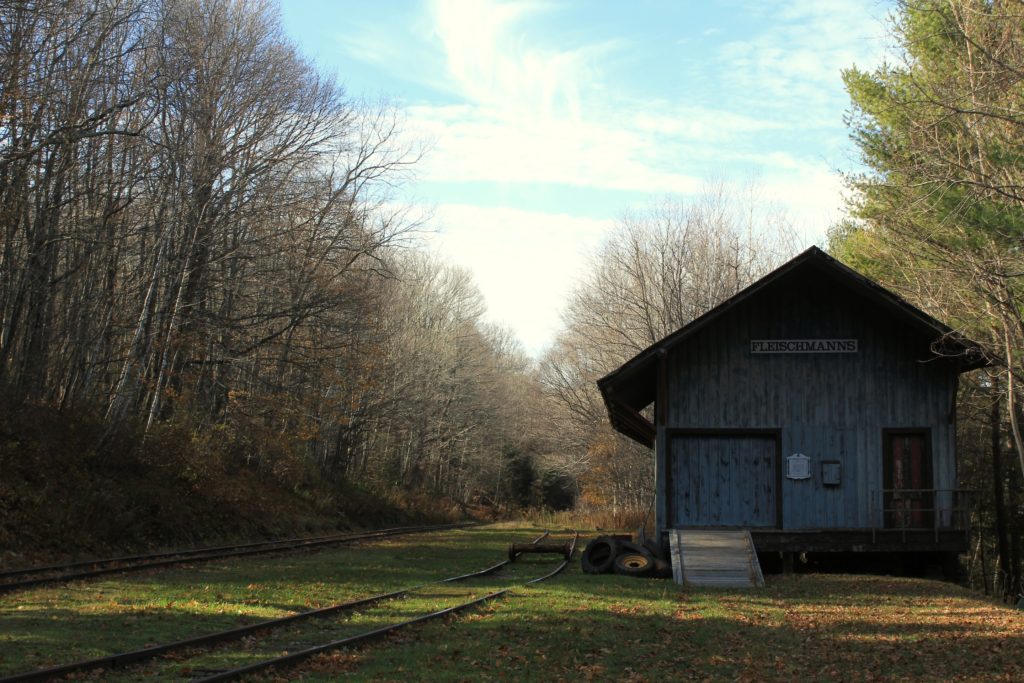Parts 2, 3 and 4 of Fleischmanns, A Poem in Eight Parts
(Imaginative Historical Projection)
By Bill Birns
Part 2: Historic Proclamation of 1913
Mr. Julius Fleischmann and Mr. Max Fleischmann,
heirs to Senator Fleischmann, have offered
their good wishes and
the six and a half acre parcel
known as the Fleischmann Mountain Athletic Grounds
to the people of the Village of Griffin Corners,
to be used by the people in perpetuity,
insofar as no admission can be charged
for any event within the park and
that the park be called Fleischmann Park, and
a sum of fifty thousand dollars be on deposit
in the village bank for the endowment of the park.
Mr. Fleischmann and Mr. Fleischmann sincerely acknowledge
the intention of the village to change its name to Fleischmanns.
Part 3: The Hardenbergh Patent
These mountains have always been bought and sold
since native hands put marks on tricks presented them,
and Kings gave others’ land as gifts: a brother’s realm
passed to a daughter, Queen Anne, who gave the mountains away.
Two million acres! The Hardenbergh Patent –
two million acres of land shrewdly sought
through who-you-know negotiations and palms,
perhaps, sliding a guilder or two in the right hands.
The good settlers of Hurley Flats had asked
the royal governor (who loved cross-dressing)
for woodlots and pasturage, up-country,
in the wild lands, beyond the west slope.
Didn’t get it. Rich folks did.
April twenty, seventeen oh eight
(it ought to be here said) the grant was made.
Hardenbergh, Lewis, Rokeby, Nottingham,
Faconnier and Lurting and lurking partners, too
hidden in the deal, insiders, self-seekers
were granted the land settlers had sought –
middlemen! Those pioneers you grew up admiring
lost the land to speculators,
investors seeking a new world of wealth
and power and family. They won.
Here, on the Patent, farmers paid rent
first “one York shilling per acre”
then “five bushels sweet
merchantable winter wheat
for one hundred acres of land”
(I am quoting here from an old history).
Land undivided, leased, never sold,
estates developed, death defied
through primogeniture, first born son
gets all: an American aristocracy!
Family pride, Anglicanism and conservative
principles, intermarriage to keep out
new strivers, so our new York shire
became image of the old.
Land undivided, leased, not sold,
If farms were leaseholds, were farmers serfs?
Always rich man’s land. Mountains
of ambition and a smart Scot
named Livingston come to this country,
bought and sold, made himself
valuable to the right people, married up,
and got himself a patent from the King.
His manor on the east side of the river,
a couple thousand acres along the shore
and three hundred or so more far inland,
shrewd son of a gun he was, Robert
stole himself all the land-between to make
his manor – hundreds of square miles
from river’s edge to New England’s fuzzy border:
he made himself a lord in our new world,
made himself progenitor of a line of patent lands
called Livingston Tract, Morgan Lewis Tract,
Gulian Verplanck Tract, Montgomery Tract,
Armstrong Tract: each named
for the colonial aristocrat deeded to
a Livingston and the land.
Part 4: A Double History
Fleischmanns came into being twice:
first as Griffin’s Corners in
the middle 1800s, then
as Fleischmanns in the 1880s when
Mr. Charles Fleischmann decided that if Jews were going to
face insult and refusal at goy hotels, then
he’d found his own resort where that sort of thing
just wouldn’t, in fact, couldn’t, happen.
He took the train in from the Midwest,
stopped in Griffin Corners, saw
the rich old goys had a park
on the hill
at the east
end of the village, and
bought sixty acres from a local farmer,
sixty acres that included the hill
on the west end of the village.
Those goys were the aristocratic, river valley
Armstrong family. The original Armstrong,
the General had built their mountain retreat
back in the 1840s, a big house facing west
where the moneyed Episcopalian Armstrong
brood could enjoy cool mountain air in August
and September before returning to
their river valley estate
to spend a couple of months before
returning to their Fifth Avenue houses
for the season. General Armstrong,
had sent his agent,
a river valley hustler, country lawyer
land agent named Matthew Griffin
to scout out his 8000 acre property
up here in the mountains. So,
Griffin Corners, when the agent
established a Post Office in what should have been
called Armstrong Manor, if truth be told.
Shame the old general died
a couple months after
the completion of his house.
